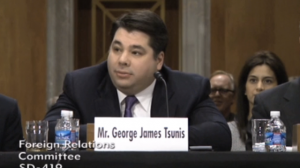The State Department is filled with veteran foreign service officers with years of experience in international relations. Most of them are products of elite universities, where they studied subjects like conflict resolution or international trade theory. Many are multilingual, and all have deep expertise on the political scenes of various countries.
Yet they routinely watch as deep-pocketed political donors with little or no foreign service experience are appointed to serve as America’s ambassadors overseas. The practice is so common that a pair of international relations scholars at the University of Pennsylvania were able to put prices on various plum ambassadorships. According to The New York Times, “the study found that political ambassadors who had made campaign donations of $550,000, or bundled contributions of $750,000, had a 90 percent chance of being posted to a country in Western Europe.” The best postings — in France or Monaco — could cost up to $6.2 million in direct contributions.
The US is an outlier in this regard; according to The Times, other democracies’ diplomats “are nearly always career professionals, products of intense competition and intensive training, with successive foreign rotations for posts deemed to require in-depth knowledge of a region, culture and language — not just political connections.”
Sometimes these arrangements work out fine. Sometimes they don’t. Which brings us to yesterday’s Senate confirmation hearings for George Tsunis, the founder and CEO of Chartwell Hotels and Barack Obama’s nominee to serve as our ambassador to Norway. According to Open Secrets, Tsunis and his wife are among the country’s top individual donors, having raised almost a million dollars for the 2012 Obama campaign.
Interestingly, all that fundraising didn’t provide Tsunis with a deep understanding of Norwegian politics.
Here’s how The Local, Norway’s English-language newspaper, reported an exchange between Tsunis and Sen. John McCain (R-AZ):
Asked by Senator John McCain what he thought it was about the “anti-immigration” Progress Party that appealed to Norwegian voters, Greek-American businessman George Tsunis seemed unaware of the party’s role in the ruling coalition.
“You get some fringe elements that have a microphone and spew their hatred,” he said in the pre-appointment hearing. “And I will tell you Norway has been very quick to denounce them.”
McCain interrupted him, pointing out that as part of the coalition, the party was hardly being denounced.
“I stand corrected,” Tsunis said after a pause. “I would like to leave my answer at… it’s a very, very open society and the overwhelming amount of Norwegians and the overwhelming amount of people in parliament don’t feel the same way.”
The blunder came after a faltering, incoherent performance from Tsunis, in which he made a reference to Norway’s “president,” apparently under the impression that the country is a republic rather than a constitutional monarchy.
Other Norwegian media described Tsunis as having “trampled through the salad bowl,” according to Olivier Knox at Yahoo News. Knox added that Tsunis wasn’t the first to fumble the hearing:
McCain, already flummoxed by the apparent inability of Obama’s choice to be ambassador to Hungary to list strategic US interests there, closed his questioning with a bit of sarcasm: “I have no more questions for this incredibly highly qualified group of nominees.”



